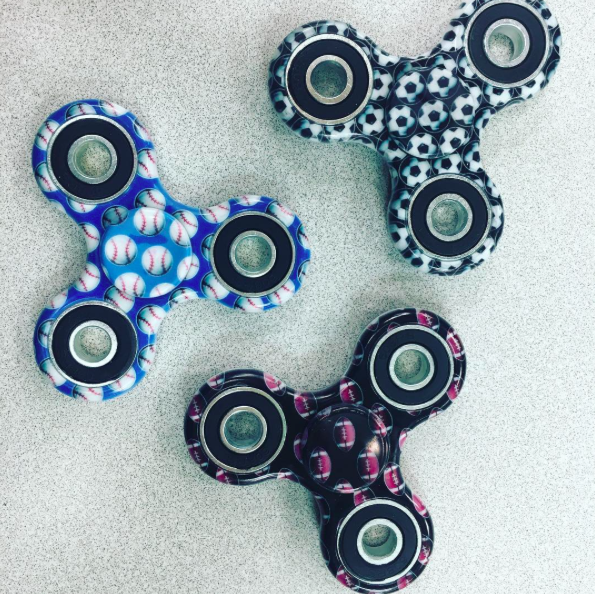Are fidget spinners dangerous?

By Marcus Goh and Adrian Kuek
Grade Expectations is a weekly feature on education in Singapore. Expect fun activities, useful tips and insightful news on learning. It’s not just about your child’s grades – it’s about raising a great child!
If you’ve been around any students recently, you’ll have noticed some of them carrying around a spinning object that looks a little like a curved shuriken. These are fidget spinners, and with a flick of the finger, they’ll start spinning faster than the eye can follow.

What are fidget spinners?
Fidget spinners started gaining popularity in March this year, and can be bought anywhere from pasar malams to department stores. They range in price from $2 to $20, with many costing much more, and they largely follow the same three-pronged design. They’re made to spin easily in place with a light push, and are marketed as a device to help those who have trouble focusing, like students with ADHD, autism, or anxiety. Recently, they’ve also been marketed as stress relievers too.
Before fidget spinners, a device known as a fidget cube had gained popularity on Kickstarter sites. A fidget cube is a cube with mechanisms on each face, such as gears, switches, levers, and buttons. While fidget cubes didn’t achieve the same sort of astronomical popularity that fidget spinners did, they caught on for many adults who were fascinated by the tactile quality of fidget cubes.
Even though fidget spinners have been touted to benefit those with attention or anxiety issues, there has been no research done about those claims.
Scott Kollins, a clinical psychologist and professor at Duke University, said that for fidget spinners, “there’s basically no scientific evidence that those things work across the board”.

Fidget spinners worldwide
Some schools in the United States, France, and England have banned fidget spinners, while Malaysia is reportedly waiting to see more evidence before taking such action.
There have also been reports of fidget spinners containing dangerously high amounts of lead.
A girl from Texas had also choked on the ball bearings coming from the fidget spinners, although she eventually recovered.
However, there have been relatively few reports of fidget spinners causing harm to children.

It’s just a fad
So should we be worried about fidget spinners?
While they may not provide tangible benefits, they also pose no serious risk to children, especially those who are old enough to go out and buy a fidget spinner on their own. They are a fad, just like Pokemon Go, collectible card games, or other franchises, and should be treated as such.
Unlike mobile devices, fidget spinners keep children in the real world instead of the digital realm. While they can be addictive, they can be a good option to keep children away from their digital devices.
Fidget spinners are also usually a one-time purchase, meaning that children don’t have to keep spending money in order to keep up with their hobby, unlike collectible card games or even Pokemon Go.
Also, Singaporean students are fairly focused when it comes to their education, and there seems to have been little disruption in classes from fidget spinners – students are sensible enough to know when to play and when to stop.

All things in moderation
Just as with any trend, though, some students might get addicted to fidget spinners. Moderation is key. Banning your child from fidget spinners might prove detrimental, especially if all their friends in school have them. No kid wants to feel left out, after all.
On the other hand, if you notice your child becoming addicted and forgoing other activities to play with his or her fidget spinner, then it might be time to step in and restrict the amount of time spent with the toy.
Give it a year, and the fidget spinner trend will probably die out.
Marcus Goh runs Write-Handed, a creative writing studio. At the same time, he teaches Secondary English at The Write Connection. He has been a specialist tutor for English and Literature (Secondary) since 2005.
Adrian Kuek runs Joyous Learning, an enrichment centre that specialises in English, Mathematics, Science and Creative Writing for Primary. He previously served as the academic director of one of Singapore’s largest enrichment centre chains for over seven years.




